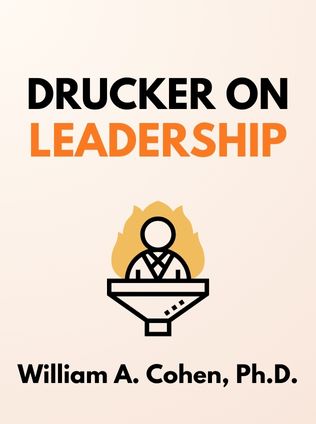
Drucker on Leadership
New Lessons from the Father of Modern Management
By William A. Cohen, Ph.D.
Published 11/2009
About the Author
William A. Cohen, Ph.D., is a noted authority in the field of leadership and management. With a distinguished career as a retired Major General in the U.S. Air Force Reserve, Cohen brings a unique perspective to the study of leadership, combining military discipline with academic rigor. He was the first graduate of Peter Drucker's executive Ph.D. program, where he developed a profound appreciation for Drucker's management philosophies. Cohen's extensive body of work includes several influential books such as "The Art of the Leader" and "A Class With Drucker," which explore the practical applications of Drucker's theories. His writings are characterized by a deep understanding of the principles of leadership and their relevance in both military and civilian contexts.
Main Idea
"Drucker on Leadership: New Lessons from the Father of Modern Management" delves into the scattered teachings of Peter Drucker on leadership, synthesizing them into a coherent framework that highlights the critical role of leadership in effective management. While Drucker did not write a single comprehensive work solely on leadership, his insights are interwoven throughout his numerous books and articles. Cohen's book aims to distill these insights, offering a clear and practical guide to understanding Drucker's views on leadership. Central to Drucker's philosophy is the idea that leadership is not innate but can be learned and developed. He emphasizes the importance of strategic planning, ethical behavior, and understanding human motivation as foundational elements of effective leadership.
Table of Contents
- Introduction: Peter Drucker and Leadership
- The Leader's Role in Shaping the Organization's Future
- Ethics and Personal Integrity
- The Military: Drucker's Model Organization
- Motivation and Leadership
- The Marketing Model of Leadership
- Epilogue: Drucker's Legacy
Introduction: Peter Drucker and Leadership
Peter Drucker, often referred to as the "Father of Modern Management," consistently emphasized the integral role of leadership within the framework of effective management. Initially ambivalent about whether leadership could be taught, Drucker's views evolved significantly over his career. He eventually asserted that leadership is a skill that can be learned, stating, "Leadership must be learned and can be learned" (Drucker). This shift reflects a broader understanding of leadership as an essential, teachable component of successful management.
Drucker's exploration of leadership extends beyond traditional concepts, challenging the notion that leadership is purely an innate trait. He believed that leaders are not born but made, through education, experience, and reflection. This belief underscores the importance of continuous learning and personal development in the journey to becoming an effective leader.
The Leader's Role in Shaping the Organization's Future
In Drucker's view, the primary responsibility of a leader is to define the organization's mission and to set clear goals, priorities, and standards. He emphasized the importance of strategic planning, describing it as "the continuous process of making present entrepreneurial decisions systematically and with the greatest knowledge of their futurity" (Drucker). This process involves not only setting a vision for the future but also making informed decisions that align with the organization's long-term objectives.
Drucker believed that leaders must have a clear understanding of the business they are in and who their customers are. He often used the example of Sears Roebuck, which successfully transformed itself by redefining its mission to become "the informed and responsible retailer." This clear and focused mission statement guided the company to immense success, illustrating the power of a well-defined strategic vision.
The strategic planning process, according to Drucker, involves several key components:
Sign up for FREE and get access to 1,400+ books summaries.
You May Also Like
The Subtle Art of Not Giving a F*ck
A Counterintuitive Approach to Living a Good Life
By Mark MansonRich Dad Poor Dad
What the Rich Teach Their Kids About Money - That the Poor and Middle Class Do Not!
By Robert T. KiyosakiHow To Win Friends and Influence People
The All-Time Classic Manual Of People Skills
By Dale CarnegieQuiet: The Power of Introverts
The Power of Introverts in a World That Can't Stop Talking
By Susan Cain



















